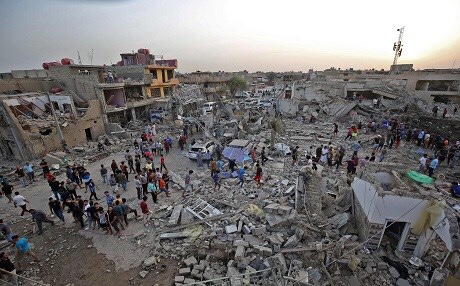
Muqtada al-Sadr encourages project for Iraqis to hand over weapons to state
Iraqis inspect the aftermath of an explosion in Baghdad's Sadr City district on June 7, 2018. Photo: Ahmad al-Rubaye | AFPERBIL, Kurdistan Region — Following deadly attacks in Baghdad's Sadr City, popular Iraq Shiite cleric Muqtada al-Sadr proposed a project for all factions to hand over weapons to the state.
"[I]n dedication of exclusively strengthening the army and police, I call for the initiation of disarmament and handing them over to the Iraqi state," read a statement released by Sadr on Friday.
Two explosions rocked the Sadr City district of Baghdad near a Shiite mosque on Wednesday night. Reuters reported at least 18 people were killed and more than 90 were wounded.
Sadr initially condemned the explosions, as it was unclear whether there was an attack or a Sadr weapons cache exploded.
In a gesture of "good faith" Sadr on Friday called on the forces in the Iraqi Army and those under Interior Minister Qasim al-Araji "to start the campaign after the Eid to announce Sadr City as a disarmed city, and then implement that for the rest of areas."
Sadr is an outspoken Shiite cleric whose Sayirun list garnered the most votes in Iraq's parliamentary election on May 12. He partnered with Iraq's communist party and campaigned on ending corruption while appealing to the disenfranchised.
"I advise for the weapons to be sold to improve areas, and for arms and money be in the hands of a trustworthy government," he added.
Iraq's capital has many checkpoints. However, Sadr sees the need for better coordination between Iraq's security institutions which are fragmented between local police forces, federal police in the interior ministry, the army and its specialized forces, paramilitary units and various militias.
Sadr's solution is "not through checkpoints and the militarization of cities, but through intelligence and the cooperation of the residents with the security forces and notifying them of breaches."
Sadr, himself, led the Mahdi Army during the insurgency in the 2000s. He went to Iran, and then returned during the ISIS conflict to lead Saraya al-Salam in 2014.
The group sometimes fought alongside Hashd al-Shaabi, the largest group within the Popular Mobilization Forces, which were recognized by the Iraqi parliament in December 2016 and officially put under the command of Iraqi Prime Minister Haider al-Abadi.
Abadi's list finished third in the election behind Sadr and Hadi al-Amiri's Fatih Alliance. Amiri has great influence within the Hashd, who outnumber Iraq's formal military forces.
The results of the election are currently contested by a majority of incumbent MPs and the current government. They have announced a full manual recount of ballots nationwide, and the annulment of the diaspora, IDP, and Kurdistan Region security forces' votes.
No comments:
Post a Comment